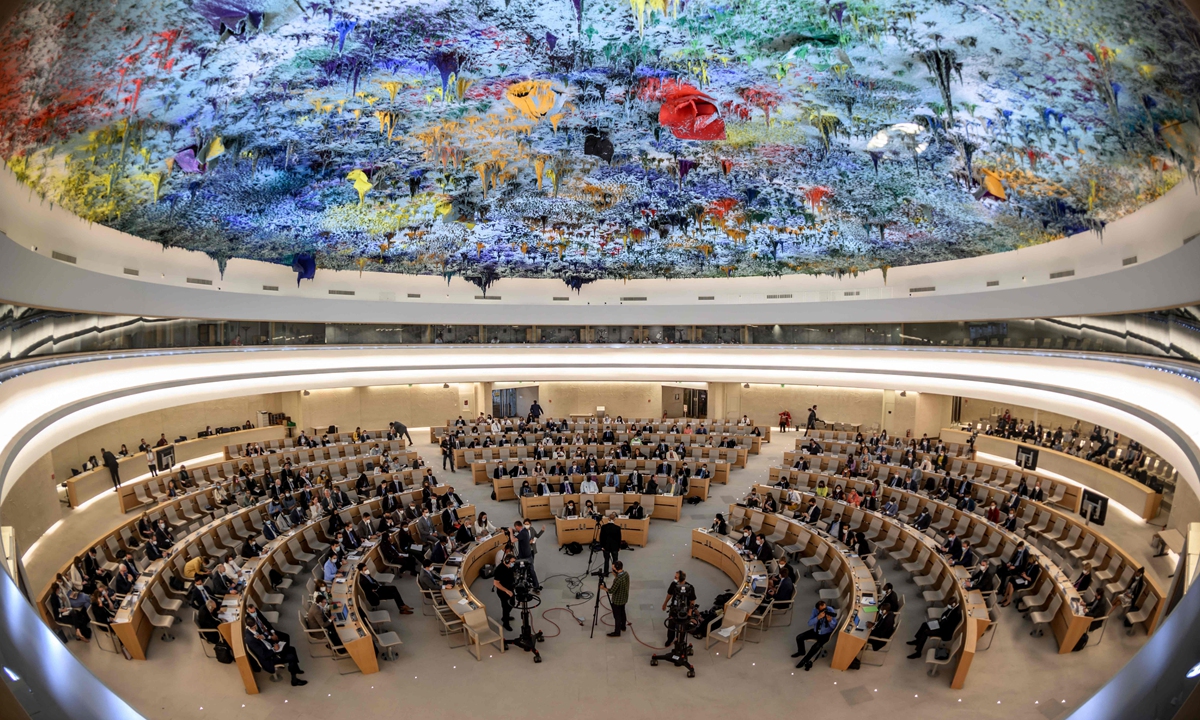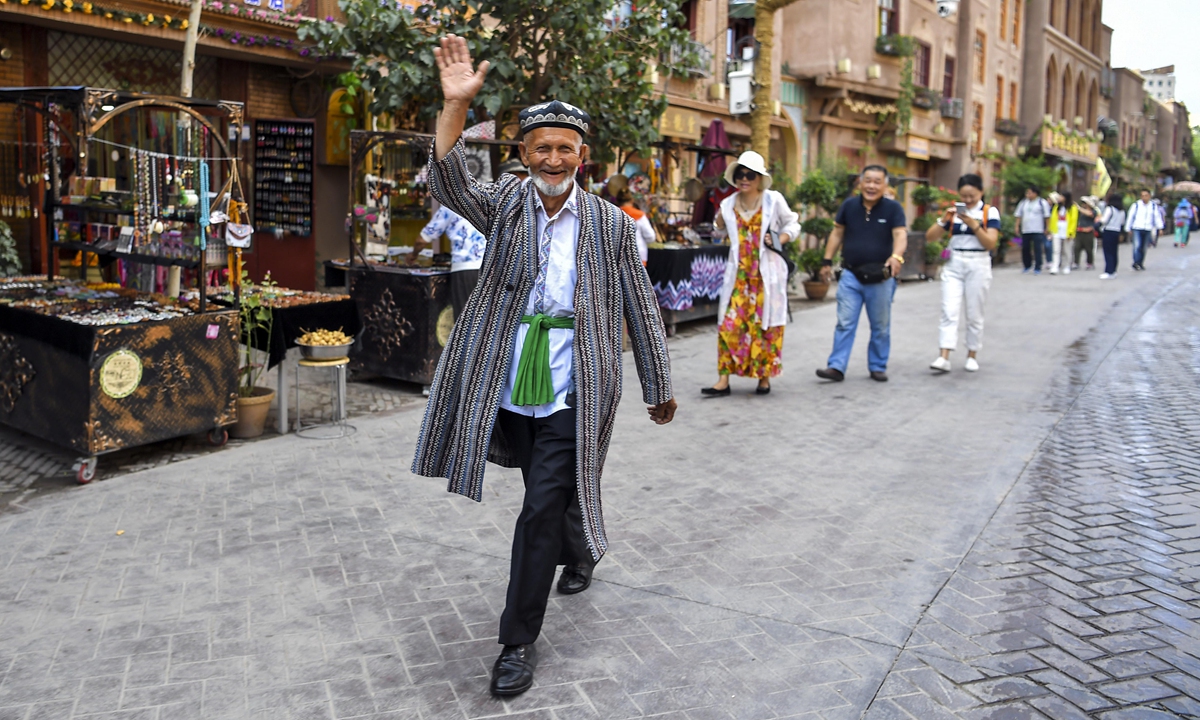Editor's Note: As the 52nd session of the UN Human Rights Council continues, various sideline events have been held to discuss issues on human rights developments in different parts of the world. However, some anti-China forces and countries are abusing the platform by inviting so-called "victims" of Xinjiang vocational and education centers to attend certain sideline events to spread disinformation about China, especially in its Xinjiang, Xizang, and Hong Kong regions, in an attempt to beleaguer China by hyping human rights violation topics.
Are these "victims" credible or just actors hired by anti-China forces to orchestrate stunts to smear China? Have their stories genuine or have they been fabricated to amplify the anti-China narrative?
The Global Times learned from sources about an interlude that happened at a sideline event during the 52nd session of the UN Human Rights Council, which sheds some light on how anti-China forces spread lies to slander China's human rights record in its Xinjiang Uygur Autonomous Region.

The UN Human Rights Council in Geneva, Switzerland Photo: VCG
"Why did the translation differ from what the 'victim' really said?" This question was asked during a sideline event at the 52nd session of the UN Human Rights Council by an expert from China Society for Human Rights Studies after she heard a translator from an anti-China organization wrongly translated part of a story narrated by a "victim" supposedly from the region. However, no specific reason was given and the organizers hastily ended the meeting.
The scenario happened on Monday at a sideline event themed "Human Rights in China," which was jointly held by the Society for Threatened Peoples and certain anti-China organizations, including the Uyghur World Congress (WUC) - a US-backed, right-wing, regime-change network seeking the "fall of China."
Gulbahar Hatiwaji, a member of the WUC, attended the event via video link. While speaking in Uygur, Gulbahar recounted her "experiences" as a "survivor" of the training centers in the Xinjiang region, including alleged incidences of being coaxed to return to the region, and being detained, tortured, and sterilized. While Gulbahar asserted she was detained by the local security bureau for "disturbance of public order," the translator Zumretay Arkin, who is also a member of the WUC, said in English that Gulbahar was detained "for splitting China."
Niluobaier Aierti, a member of the China Society for Human Rights Studies, also attended the sideline event and noted the translation mistake, asking questions to which no answers were offered.
Wrong translation"The charge for disturbance of public affairs is totally different from 'splitting China' and such a mistranslation seemed to have been made on purpose," Niluobaier told the Global Times. The translator neglected or added some information when "retelling" what the "victim" had said, which made it more like a stunt than a true story. The distortion of the charges made people question the veracity of the "victim's" assertions.
After discussing with Wang Jiang, a scholar from China Society for Human Rights Studies, who also attended the sideline event, Niluobaier raised her question.
"In the Q&A session, I raised my question. I first introduced myself by saying that I am also Uygur from China's Xinjiang region and said that what I had learned from the region was totally different from what was presented by organizers in the event. When I said that I also want to share… before I finished my statement, the host interjected and asked me to directly ask my question," said Niluobaier.
Niluobaier then threw her question about the wrong translation to the panel and asked what on earth Gulbahar had been detained for. "If she did disturb the public order, she should then have been detained in accordance with the law. If she lied in the first place, how can we believe the other part of her story?" Niluobaier asked at the event.
Niluobaier said that Arkin, the translator, and other organizers seemed surprised and a little panicked when hearing the question and then asked Gulbahar to explain why the Chinese government detained her. Gulbahar then repeated that she was detained for "disturbance of public order."
Even before Gulbahar had finished, the translator Arkin quickly admitted her mistake but still quibbled that the Chinese government released Gulbahar in 2019 with no charges having been pressed.
Before Niluobaier could continue her line of questioning, the organizer abruptly concluded the event.
"Actually, the organizers seemed to be on high alert regarding our attendance from the moment we appeared. They stared at us, observed our reactions, and interjected when we attempted to ask questions," Wang said.

A senior man waves to tourists in Kashi, Northwest China's Xinjiang Uygur Autonomous Region in June, 2019. Photo: VCG
Unspoken truth behind numerous liesWhy were the organizers and the translator nervous about Niluobaier and Wang's attendance? Did Gulbahar tell the truth? The answer seems to be no. According to information from the Xinjiang regional government, as a member of the WUC, Gulbahar and her husband, who is also a member of the WUC, have long engaged in separatist and terrorist activities in the region.
On May 26, 2006, Gulbahar and her eldest and second eldest daughter went to find her husband, who was a political asylum seeker in France. They colluded with other heads of the WUC and plotted a series of activities during the terror attack on July 9, 2009, according to a press conference held by Xinjiang regional government in May 2021.
In 2009, Gulbahar went back to the Xinjiang region under the pretext of a simple visit and attempted to incite terror attacks in Karamay. Later in 2012, 2014, and 2016, she, her daughter, and her husband returned to China in an attempt to incite terror attacks.
In November 2016, under the pretext of handling her pension and retirement plan affairs, Gulbahar returned to China with a plan to instigate terror attacks and was arrested by the public security bureau.
On January 29, 2017, the public security bureau took her into criminal detention. During the investigation, Gulbahar refused to confess her crimes and gave false testimony, but later confessed her husband and daughter's separatist activities and said she regretted their activities. Out of humanitarian concern, Gulbahar was allowed to leave China for France on August 21, 2019, to take care of her expectant daughter.
After leaving China, Gulbahar began to spread lies about her experiences in the region by authoring a book in which she called herself a "survivor" of the vocational and education centers. Some media outlets in France reported on Gulbahar and her book in 2021. However, the Chinese Embassy in France refuted Gulbahar's claims and said that instead of "being coaxed" to return to China, Gulbahar returned to the Xinjiang region of her own free will to sign retirement papers. She claimed to have been subjected to seven years in a so-called camp, but she did not face criminal prosecution and was never imprisoned for seven years.
The statement issued by the embassy noted that Gulbahar's claims of being "tortured" and "sterilized" were also lies as she had been busy visiting relatives in different places. How could she have then been tortured?
Many of Gulbahar's assertions in her book have also been questioned. For example, if the purpose of "imposed sterilization" is to impede birth, what then would the point have been to forcibly sterilize Gulbahar who was already 55 years old at the time of the alleged incident?
Despite there being numerous unanswered questions regarding her book and narrative, Gulbahar was frequently invited to share her "story" by foreign media outlets and to attend events organized by anti-China forces. Regardless of the event's theme, the Global Times has noticed that Gulbahar adapts her narrative to make it align with the moment's efforts to slander China as led by Western media sources.
By combining all the allegations levied against China's Xinjiang region with regard to human rights violations in one narrative, the WUC has solidified Gulibahar's image as a "victim" to maximize the value of her story. They continue to adjust parts of her story in accordance with changes in public attention, Niluobaier said.
When "separatism" is a trendy word, the WUC will turn Gulbahar's detention charge into one of "separating China," while when the public focuses more on "disturbance of public order," the charge will be altered accordingly. Gulbahar's stories can be customized depending on the assumed needs of the target audience when attacking China and no matter what she was actually charged with, the conclusion is always that she was innocent but was "persecuted" in China, said Niluobaier.
UN abused by disinformation
Gulbahar is neither the only "victim" put forward by the WUC, nor the only one to share stories rife with inconsistencies globally. For example, Tursunay Ziawudun, a source in a BBC sensationalist report accusing China of "mass rape" in the training centers in Xinjiang region has been found to have changed her "testimony" multiple times in past years, especially after she was found and "supported" by the WUC when she began to make "rape" accusations.
These reports of "camps," "forced labor," "genocide," and "sexual assault" show the West's escalating hype of Xinjiang region. These media reports are aimed at future political moves, an old tactic used by Western media sources and governments, analysts said.
All the alterations seem to confuse the WUC members, making their narratives self-contradictory. This comes as no surprise as many of the WUC members, for example, the translator Arkin, left the Xinjiang region decades ago, Niluobaier said.
With more people who live in Xinjiang region telling their own stories and more people coming to visit the region, all the baseless accusations against the region will be debunked, Chinese experts said.
As human rights topics related to China's Xinjiang region are frequently used as weapons to attack China, some anti-China forces are abusing the UN Human Rights Council by flagrantly spreading disinformation and the Monday sideline event is only the latest example, said Wang.





